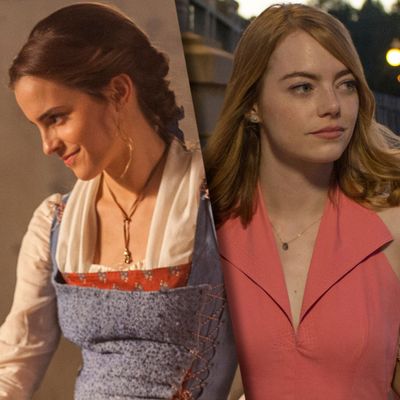
Emma Watson is a good actress who looks the part of a Disney princess, but she does not have the voice of one. In her defense, few people do. Aspirational figures that they are, Disney princesses tend to sing songs that push the limits of the average vocal range without breaking so much as a cartoon sweat. As anyone who’s made a bad choice at karaoke can tell you, those girls love their key changes — see “Reflection,” and don’t get me started on “Let It Go.” So it’s not too much of a surprise when, as Emma Watson runs up to a hilltop for “Belle (Reprise)” in the new Beauty and the Beast, her voice wavers. She’s pitchy and rushed, seemingly hesitant about all that “adventure in the great wide somewhere.”
Here’s a short clip of Emma Watson singing in the film for reference:
Before Beauty and the Beast premiered, Watson described the experience of singing on film as “terrifying” — a reasonable fear. Despite what fairy tales might have you believe, there are some things you can’t accomplish just by trying hard and believing in yourself. With all the swaddling protections of a big studio effort — singing lessons, Auto-Tune, the chance to prerecord in the studio — the actress was guaranteed to at least sound fine, but a part like Belle demands something more than “fine.” In the 1991 film, Paige O’Hara, who had previously appeared in various Broadway musicals, played the part with mid-Atlantic spunk and precise schoolgirlish articulation best seen in “Something There.” Dozens of actresses have taken on the part on Broadway and theatrical tours, and every drama kid has pretended to be Belle at least once (I speak from experience). We’ve all learned one thing: To succeed at the part, you have to be exceptional. Watson, to put it frankly, isn’t.
Beauty and the Beast might be the most egregious attempt to shove an actor into a singing role beyond their abilities, but it certainly isn’t alone. Just within the realm of Emmas, there’s Emma Stone, who replaced Watson in La La Land and went on to win an Oscar, despite the fact that her vocal abilities are nothing to write home to Boulder City about. Stone’s saving grace is the music itself: Her big number “Audition (the Fools Who Dream)” comes with the world’s most accommodating key change, the equivalent of going half a speed faster on a treadmill. Meryl Streep dodged the “Can she really sing?” bullet in Florence Foster Jenkins by singing poorly; in Into the Woods she dodged it by being Meryl Streep. Her co-stars in that musical, from The Last Five Years’ Anna Kendrick to future Mary Poppins Emily Blunt, all do their best with the intricacies of Sondheim, but mostly they make you wish for some experts who could step up to the task. Audiences may love an underdog story, but nowhere was the talent divide more apparent than in 2012’s Les Misérables, which included both singers who can act (Broadway’s Samantha Barks), actors who can sing (Anne Hathaway), and actors who tried their best (Russell Crowe).
Thus I propose an old Hollywood solution to a new Hollywood problem: Let’s bring back vocal dubbing. If you’re going to hire famous actors to bring some star power to your movies, help them out by letting someone else do the hard part. Back in the movie musical heyday, this practice was fairly common — the late Marni Nixon, for instance, provided the singing voice of everyone from Deborah Kerr to Audrey Hepburn — but those who provided dubbing often went without fair credit. But that’s a black mark against Hollywood, not against dubbing itself. If we had our way, the dubbers would get fair recognition, and hopefully the chance to transition into on-camera roles using their behind-the-scenes exposure, Singin’ in the Rain–style. Sure, bringing back dubbing might strand a bunch of talented potential stars in the unglamorous position of acting as other people’s voices, but it might be worth it, if only to save audiences from the secondhand embarrassment of watching amateur singers flail.
There is, of course, another solution to our current scourge of just-okay singers: Start casting movie musicals with actors with proven vocal talent. But in an industry where so many projects are packaged around known quantities, this seems like an impossible dream. I’m all for stuffing the likes of Amy Adams, Luke Evans, or Cynthia Erivo into every movie with a melody, but that seems about as likely as a future where Tom Cruise is the only actor allowed to do stunt work.
It’s nice to believe that anyone could open their mouths and sound like a princess. The truth, as with so many Hollywood fantasies, is much less appealing. If you really want to sell the myth, then the talent has to be superhuman — dub the voices, just as you fake stunts, apply makeup, and at this point, even transform the actors’ appearances. Commit to the fantasy. If we wanted reality, we wouldn’t be seeing a movie with a talking teapot.





